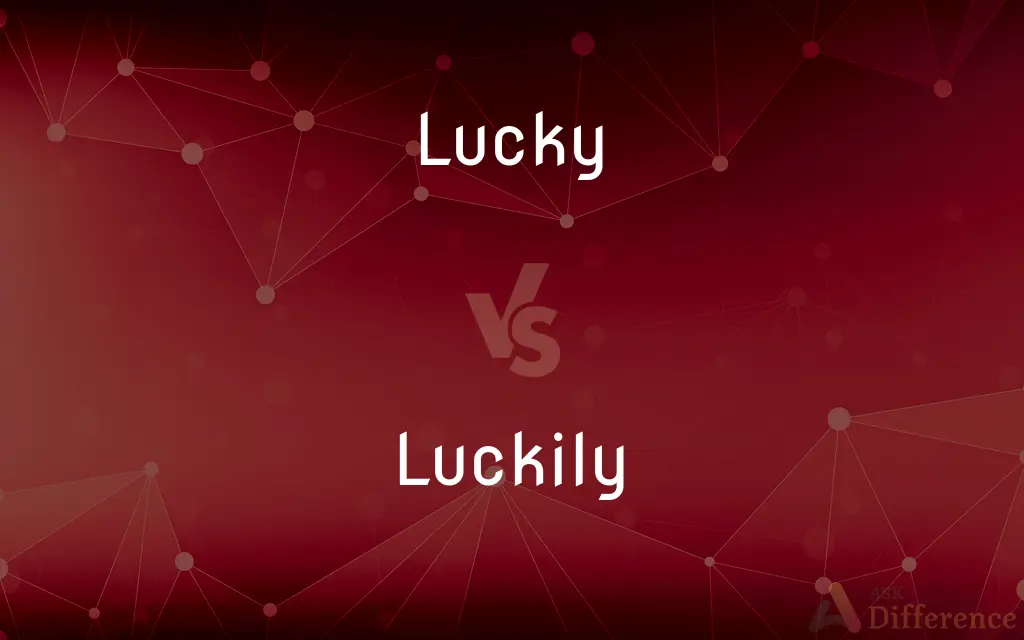Lucky vs. Luckily — What's the Difference?
Edited by Tayyaba Rehman — By Urooj Arif — Updated on April 3, 2024
"Lucky" describes someone or something that benefits from luck, while "luckily" is an adverb used to describe an action or situation that is fortunate. "Lucky" attributes fortune directly, "luckily" explains the manner of fortune.

Difference Between Lucky and Luckily
Table of Contents
ADVERTISEMENT
Key Differences
"Lucky" is an adjective, which means it is used to describe nouns, such as people, places, or objects. For example, a "lucky person" is someone who frequently benefits from good fortune, and a "lucky charm" is an object believed to bring good luck. This use emphasizes the quality or state of being fortunate. On the other hand, "luckily" is an adverb, modifying verbs, adjectives, or other adverbs, indicating that something happens in a fortunate way. For instance, saying "luckily, we arrived on time" uses "luckily" to describe the fortunate circumstances under which the action of arriving was accomplished. It often introduces a sentence to express relief, gratitude, or happiness about a positive outcome that was not guaranteed.
While "lucky" is directly linked to the subject it describes, implying that the subject possesses luck or is characterized by it, "luckily" is more about the context or manner in which events unfold. It's the difference between having an inherent trait of fortune ("lucky") versus experiencing a fortunate situation ("luckily").
The distinction also affects the tone and focus of a sentence. Using "lucky" focuses on the trait of the noun being described, suggesting a more permanent or inherent quality. In contrast, "luckily" focuses on the specific circumstances or outcomes, highlighting the serendipity of an event rather than an enduring characteristic.
In narrative and conversation, the choice between "lucky" and "luckily" can subtly change the emphasis from the inherent qualities of the subject to the fortuitousness of the situation, and vice versa. This choice can convey different nuances of meaning and attribution of fortune, depending on the speaker's intent.
Comparison Chart
Part of Speech
Adjective
Adverb
ADVERTISEMENT
Definition
Describes someone or something as having good fortune.
Describes the manner in which an action or event occurs fortunately.
Usage
Used to modify nouns.
Used to modify verbs, adjectives, or other adverbs.
Example
"He is a lucky winner."
"Luckily, the rain stopped before the game started."
Focus
Attributes fortune directly to the subject.
Indicates the fortunate nature of a situation or action.
Tone
Suggests a more permanent or inherent quality of being fortunate.
Highlights the serendipity or temporary nature of an event.
Compare with Definitions
Lucky
Having good fortune.
She found a lucky coin on the street.
Luckily
As luck would have it.
Luckily, the store was still open.
Lucky
Beneficial because of luck.
That was a lucky guess.
Luckily
Reflecting a positive turn of events.
Luckily, the weather cleared up for the picnic.
Lucky
Bringing good luck.
A lucky charm can sometimes feel reassuring.
Luckily
By good fortune.
Luckily, we missed the traffic jam.
Lucky
Fortunate in outcome.
It was a lucky escape from the accident.
Luckily
In a fortunate manner.
The interview went luckily smoother than expected.
Lucky
Marked by luck.
He's lucky to have such friends.
Luckily
Expressing gratitude for fortune.
Luckily, everyone was safe after the earthquake.
Lucky
Having or attended by good luck.
Luckily
With or by favorable chance
Luckily, the police came right away.
Lucky
Believed to bring good luck
Hoped to draw a lucky number.
Luckily
In a lucky manner; by good fortune; fortunately.
They luckily escaped injury.
Lucky
(of people) Favoured by luck; fortunate; having good success or good fortune.
A lucky adventurer
The downed pilot is very lucky to be alive.
Luckily
In a lucky manner; by good fortune; fortunately; - used in a good sense; as, they luckily escaped injury.
Lucky
Producing, or resulting in, good fortune
A lucky mistake
A lucky cast
A lucky hour
Luckily
By good fortune;
Fortunately the weather was good
Lucky
(bingo) seven
Lucky
Favored by luck; fortunate; meeting with good success or good fortune; - said of persons; as, a lucky adventurer.
Lucky
Producing, or resulting in, good by chance, or unexpectedly; favorable; auspicious; fortunate; as, a lucky mistake; a lucky cast; a lucky hour.
We doubt not of a fair and lucky war.
Lucky
Blessed with good fortune;
Considered himself lucky that the tornado missed his house
A lucky guess
Lucky
Having or bringing good fortune;
My lucky day
Lucky
Tending to favor or bring good luck;
Miracles are auspicious accidents
Encouraging omens
A favorable time to ask for a raise
Lucky stars
A prosperous moment to make a decision
Common Curiosities
What does "lucky" mean?
"Lucky" describes a person, place, or thing that experiences or is characterized by good fortune.
Is "luckily" always positive?
Yes, "luckily" denotes a positive outcome or a fortunate turn of events, expressing relief or gratitude.
How is "luckily" used in a sentence?
"Luckily" is used to describe the manner in which an action or event occurs under fortunate circumstances, often at the beginning of a sentence.
Can "lucky" and "luckily" be used interchangeably?
No, because "lucky" is an adjective and "luckily" is an adverb, so they modify different parts of speech in a sentence.
Why might someone prefer to use "luckily"?
One might use "luckily" to emphasize the fortuitous aspect of how events unfolded, highlighting the serendipity rather than attributing luck to a person or object.
How do cultural perceptions of luck influence the use of "lucky" and "luckily"?
Cultural perceptions can influence how luck is attributed, either as an inherent quality ("lucky") or as a fortunate circumstance ("luckily"), reflecting different beliefs about the source of good fortune.
What makes someone "lucky"?
Being "lucky" implies that a person frequently experiences good fortune, either by chance or as deemed by others.
Can the use of "luckily" imply skill or effort?
While "luckily" attributes the outcome to fortune, it doesn't exclude the presence of skill or effort; it merely focuses on the fortunate nature of the circumstances.
How does the use of "lucky" affect the perception of an event?
Using "lucky" suggests that the event or outcome was due to good fortune, often implying a more stable or inherent quality of the subject.
Does "lucky" imply a lasting trait?
"Lucky" can imply a more permanent trait of a subject, suggesting that they consistently experience good fortune.
Share Your Discovery

Previous Comparison
Aspen vs. Birch
Next Comparison
Wealth vs. FortuneAuthor Spotlight
Written by
Urooj ArifUrooj is a skilled content writer at Ask Difference, known for her exceptional ability to simplify complex topics into engaging and informative content. With a passion for research and a flair for clear, concise writing, she consistently delivers articles that resonate with our diverse audience.
Edited by
Tayyaba RehmanTayyaba Rehman is a distinguished writer, currently serving as a primary contributor to askdifference.com. As a researcher in semantics and etymology, Tayyaba's passion for the complexity of languages and their distinctions has found a perfect home on the platform. Tayyaba delves into the intricacies of language, distinguishing between commonly confused words and phrases, thereby providing clarity for readers worldwide.
















































